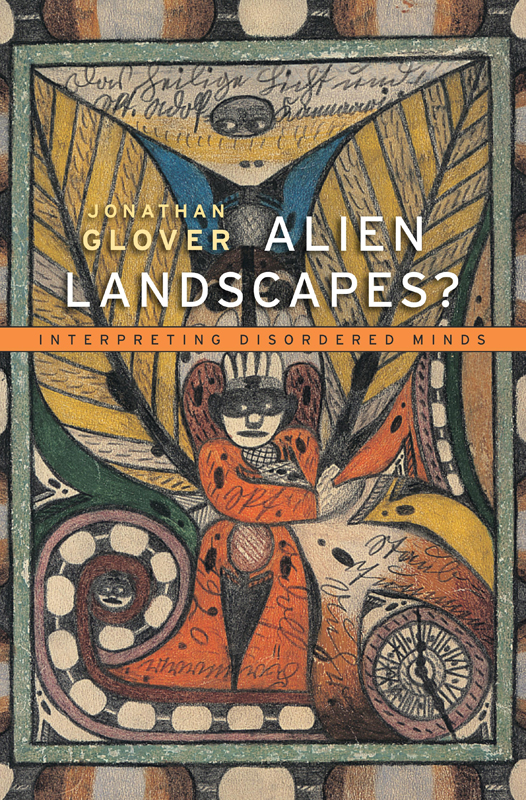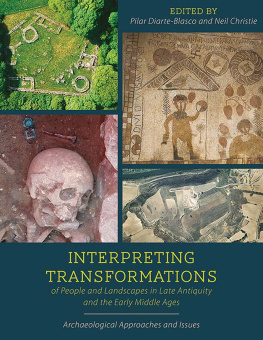Jonathan Glover - Alien Landscapes?: Interpreting Disordered Minds
Here you can read online Jonathan Glover - Alien Landscapes?: Interpreting Disordered Minds full text of the book (entire story) in english for free. Download pdf and epub, get meaning, cover and reviews about this ebook. year: 2014, publisher: HarvardUP, genre: Religion. Description of the work, (preface) as well as reviews are available. Best literature library LitArk.com created for fans of good reading and offers a wide selection of genres:
Romance novel
Science fiction
Adventure
Detective
Science
History
Home and family
Prose
Art
Politics
Computer
Non-fiction
Religion
Business
Children
Humor
Choose a favorite category and find really read worthwhile books. Enjoy immersion in the world of imagination, feel the emotions of the characters or learn something new for yourself, make an fascinating discovery.

- Book:Alien Landscapes?: Interpreting Disordered Minds
- Author:
- Publisher:HarvardUP
- Genre:
- Year:2014
- Rating:5 / 5
- Favourites:Add to favourites
- Your mark:
- 100
- 1
- 2
- 3
- 4
- 5
Alien Landscapes?: Interpreting Disordered Minds: summary, description and annotation
We offer to read an annotation, description, summary or preface (depends on what the author of the book "Alien Landscapes?: Interpreting Disordered Minds" wrote himself). If you haven't found the necessary information about the book — write in the comments, we will try to find it.
Alien Landscapes?: Interpreting Disordered Minds — read online for free the complete book (whole text) full work
Below is the text of the book, divided by pages. System saving the place of the last page read, allows you to conveniently read the book "Alien Landscapes?: Interpreting Disordered Minds" online for free, without having to search again every time where you left off. Put a bookmark, and you can go to the page where you finished reading at any time.
Font size:
Interval:
Bookmark:

ALIEN LANDSCAPES?
ALIEN LANDSCAPES?
Interpreting Disordered Minds
J ONATHAN G LOVER
The Belknap Press of Harvard University Press
Cambridge, Massachusetts and London, England
2014
Copyright 2014 by the President and Fellows of Harvard College
All rights reserved
First printing
constitute an extension of the copyright page.
Jacket art: Adolf Wlfli, Angel , 1920. The Anthony Petullo Collection.
The Library of Congress has cataloged the printed edition as follows:
Glover, Jonathan.
Alien landscapes? : interpreting disordered minds / Jonathan Glover.
pages cm
Includes bibliographical references and index.
ISBN 978-0-674-36836-1 (alk. paper)
1. PsychiatryDecision making. 2. Mental illnessDiagnosis. I. Title.
RC455.2.D42G56 2014
616.89'17dc23 2014005635
To Sam
alienist: former term for psychiatrist. Origin: mid 19th century: from French aliniste, based on Latin alienus of another
Oxford Dictionaries Online
Homo sum, humani nihil a me alienum puto. I am human;
I think nothing human alien to me.
Terence
CONTENTS
PART ONE
PART TWO
PART THREE
PART FOUR
PART FIVE
PART SIX
This book is about mental disorders: how to think about them and how well those of us outside can get a feel for what they are like from inside.
Some dispute the boundaries of mental disorder. Is autism a disorder, or should it be seen as neurodiversity? Is antisocial personality disorder rightly named, or is it just ruthless amorality? Is addiction mental illness or just moral weakness? Is either medication or psychotherapy appropriate to ease the devastating grief of bereavement, or should we avoid medicalizing this normal human experience?
When and how much do mental disorders impair agency and responsibility? When should acting under the influence of severe depression excuse someone from responsibility for what she does? What do some disorders do to a persons identity? When someone with schizophrenia shows unprovoked hostility and aggression, does that reflect him, or is it his illness? How should we draw boundaries here? How much is the original person still present in severe dementia?
This book is about the human interpretation of disordered states. Are mental disorders impenetrably alien? The genetics and brain chemistry of some of these states are starting to be understood, but do the inner landscapes of these states defy empathy at the psychological level? The question of human interpretation is important, not only for psychiatrists, psychotherapists, psychoanalysts, and psychiatric nurses. It is important for, above all, people who have these disorders, and for their families and friends, and for others who are simply interested in this area of human experience. This book is written for anyone who hopes it may be possible to interpret and understand disordered statesand for anyone who hopes, despite a disorder, to be interpreted, to be understood.
It may be presumptuous for someone who is neither a psychiatrist nor any other kind of mental health professional to write a book about these questions. Inevitably the limits of my knowledge will sometimes show through, although I hope these limits may be outweighed by the ideas and the reasons behind them. Mental disorder straddles the boundary between the sciences and the humanities. The subject I teachphilosophyis in the humanities, and this book has a humanities approach. Many mental health professionals are notably open to viewing mental disorder through the lenses of art, philosophy, poetry, novels, and the humanities in general. Some of them may feel the book presumes too much in this regard. Again, I hope there may be justifying benefits.
The book has several different origins.
In Broadmoor, a secure psychiatric hospital, I interviewed a group of men who had been diagnosed as having antisocial personality disorder. The aim was to explore the claim sometimes made that they lack a conscience. This was part of a larger project carried out with the psychiatrist Dr. Gwen Adshead. The other part of the project, under the stimulus of an invitation from the neurologist Martin Rossor, involved asking similar questions of a group of people diagnosed with frontotemporal dementia.
In 2003 I gave the Tanner Lectures on Human Values at Princeton. I chose the title Towards Humanism in Psychiatry and lectured on psychiatric interpretation and on the relations between psychiatric disorder and a persons identity. The part on identity developed thoughts I had first aired in the 2002 Aubrey Lewis Lecture at the Institute of Psychiatry at Kings College London.
I have a long-standing interest in the intersection of psychiatry and philosophy. My first book, Responsibility, published more than forty years ago, included chapters on the concept of mental illness and on mental illness and responsibility. I was drawn then to the depth and difficulty of the philosophical questions raised by psychiatry. Rereading those chapters after writing this book, I was pleased that, although my ideas have developed since, there was little I wanted to repudiate in that earlier effort. I was less pleased to notice how very little I then knew about psychiatry. I admit, however, to being now a bit envious of the youthful effrontery.
The interest remained. Fifteen years ago, on coming to the Centre of Medical Law and Ethics at Kings College London, I cooperated with colleagues in the Institute of Psychiatry and the Department of Philosophy to set up and teach a masters course in the philosophy of mental disorder. In the Centres masters course in medical ethics and law, I also set up and taught a module on psychiatric ethics.
This book did not originate purely in intellectual curiosity. Although I have not been hit by psychiatric disorder, its shadow has touched my family. A minor consequence of that has lasted for nearly a quarter of a century. Without their permission, and without their realizing it, I have been watching many psychiatrists and psychiatric teams at work. They have provided stimulus to reflect on their different approachestheir assumptions, their patterns of thought, and their ways of interpreting other people. I have also noticed how important are both the strengths and the limitations of the different kinds and degrees of perceptiveness and sensitivity they bring to their work. They have provided stimulus to reflect on their different approaches, on their assumptions, their patterns of thought, and their ways of interpreting other people. Although this is not on the surface of the book, I hope it has given it an extra dimension.

Figure I.1: Richat Structure, NASA.
An alien landscape? One of the landmarks when Earth is seen from space is the thirty-mile-wide Richat Structure, or Eye of the Sahara, found in Mauritania (). Some thought the Richat Structure was the work of extraterrestrials. Current evidence suggests it is a dome-shaped rock, first pushed to the surface and then eroded over hundreds of millions of years. The process of understanding is not yet over. We still do not know why the Eye of the Sahara is circular. But a dramatic alien landscape can yield to undramatic incremental interpretation.
A century ago Karl Jaspers published a great philosophical book on psychiatry, his General Psychopathology . It included some classic pessimism about the limits of psychiatric interpretation. Jaspers said it was possible to have empathy for people with mood disorders, but not for those with schizophrenia: These personalities have something baffling about them, which baffles our understanding in a peculiar way. There is something queer, cold, inaccessible, rigid and petrified there, even when the patients are quite sensible and can be addressed and even when they are eager to talk about themselves. We may think we understand dispositions furthest from our own, but when faced with such people, we feel a gulf which defies description.1 Anyone familiar with schizophrenia will recognize the bafflement Jaspers describes. But the discussion here will challenge the pessimism and oppose giving up too soon.
Font size:
Interval:
Bookmark:
Similar books «Alien Landscapes?: Interpreting Disordered Minds»
Look at similar books to Alien Landscapes?: Interpreting Disordered Minds. We have selected literature similar in name and meaning in the hope of providing readers with more options to find new, interesting, not yet read works.
Discussion, reviews of the book Alien Landscapes?: Interpreting Disordered Minds and just readers' own opinions. Leave your comments, write what you think about the work, its meaning or the main characters. Specify what exactly you liked and what you didn't like, and why you think so.









